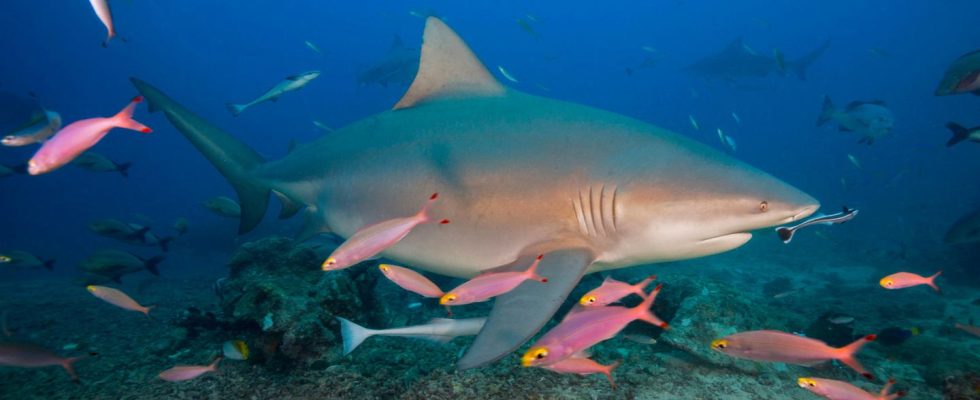Current study
Sudden cold waves cause mass extinctions in the ocean
A bull shark glides across the ocean floor among red fish
© David Fleetham / Imago Images
Researchers are actually worried because the oceans around the world are warming. However, climate change can also cause sudden cold waves underwater – with consequences that are at least as dramatic.
It must have been a shocking sight for residents: On March 2, 2021, numerous animal carcasses lined the 200-kilometer-long stretch of southeast African coast between Port Elisabeth and East London. Among them are tropical migratory fish, manta rays and sharks. More than 200 dead animals washed ashore at that time. How did this come about? Mass extinction? An international team of researchers now has an answer.
The reason for this may have been a sudden cooling of the ocean region between South Africa and Australia due to climate change. This initially sounds contradictory because the seas around the world are currently heating up. But global warming can also lead to severe cold waves underwater, shows the study in the specialist magazine “Nature Climate Science”. Global warming is changing not only air currents, but also circulations and pressure under water. This leads to so-called upwellings – cold water masses that rise from the depths towards the surface and cool their surroundings.
The surface temperature of the ocean off the South African east coast fell by just over seven degrees within one day in spring 2021; at a depth of 30 meters even over nine degrees – with dramatic consequences for the animal world: they die from temperatures that are too low for them or are pushed out of their natural habitat. More than 260 animals from 81 different species fell victim to the sudden cold event in March 2021.
Sharks are trying to avoid changes caused by climate change
In their study, the international researchers focused on bull sharks. The animals feel particularly at home in tropical and subtropical waters and are listed on the Red List of Endangered Species as “endangered with declining population development”. According to the Foundation for Marine Conservation their number has almost halved in the past few decades. One of the reasons for this is fishing. The meat of the young animals in particular is considered a delicacy. Bull sharks often become entangled in fishing nets off South African beaches as bycatch.
In addition, changes to their habitat caused by climate change also threaten marine life. Bull sharks try to avoid cold events by moving closer to the surface of the water. Some sharks also seek refuge in estuaries and bays, the researchers write in the journal “Nature Climate Change”. The scientists also observed similar behavior in manta rays and blacktip sharks.
Based on the observations, the researchers conclude that cold events are becoming more frequent and more intense due to upwelling. This pushes species out of their natural habitat and also limits coastal fishing yields. Overall, these cold events and their consequences have not been researched enough, write the study authors. The only thing that is certain at the moment is that they are becoming more frequent and more intense.


